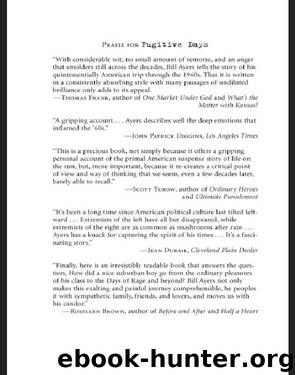Fugitive Days: Memoirs of an Antiwar Activist by Ayers Bill

Author:Ayers, Bill
Language: eng
Format: epub
Publisher: Beacon Press
19.
Diana spent part of the summer with Bernardine, Teddy Gold, and dozens of other Americans in Cuba meeting with a delegation of Vietnamese to exchange views on strategies and tactics for ending the war. When they returned to North America on a sugar boat bound for St. John’s, Newfoundland, I drove up to meet them with CW.
Most of us had come to our understanding of the world from our involvement in the civil rights and peace movements—ideology, we thought, lent a necessary seriousness of purpose to our efforts—CW, by contrast, found the movement through his involvement with a tight little leftist sect he’d joined as a teenager. When part of the movement turned forcefully toward a political line, CW’s two-year head start provided leverage, his skills already honed. He knew how to win debates inside those dark and suffocating halls, and he had mysterious friends he could call on who knew Marx and Lenin and Mao, chapter and verse.
The ascendency of ideology among us foretold the end of what had been a genuinely new left, a left that refused received ideas and based itself, instead, on the wisdom of experience. Until now the way out of disagreements was practice—if some of us believed that knocking on doors in working-class neighborhoods and engaging people in discussions about the war was effective, then that’s what we did; if others of us thought a large mobilization in Washington was the way to go, then that was our assignment. Or we could do both, and/or a hundred other things in between. The key was to act on what our knowledge demanded of us, to experiment, and then to sum it all up in order to move forward, to link our conduct to our consciousness. Our ideas would all be the fruit of our own labor, our lived experience.
Ideology became an appealing alternative in so many ways. Practice was uncertain and inexact; ideology cloaked itself in confidence. Practice was slow and ideology a smooth and efficient shortcut. Mostly, ideology was serious—people with ideology meant business. I didn’t know yet how domesticating and cruel and stupid ideology could become, or the inevitable dependency it would foster in all of us.
There was a danger now from inside, from ourselves. We were becoming prisoners of our schemes, intoxicated on theory.
The triumph of an ideology divorced from practice brought along a new reign of intellectual terror—the rule of the ideologue—and CW was its chief among us. Whatever power he had, the rest of us had handed to him. We were desperate to end the war, lurching to find a decisively effective weapon. And he knew that his big brain was perilous. I remember once when he was winning some obscure argument and Bernardine said to him, Just because you can always win, doesn’t mean you’re always right. He paused and turned to look at her, his face momentarily troubled. He looked as if he might cry. You’re right, he said softly, and that sometimes terrifies me.
CW and Bernardine had been dating before she went to Cuba, but the contrast was bizarre.
Download
This site does not store any files on its server. We only index and link to content provided by other sites. Please contact the content providers to delete copyright contents if any and email us, we'll remove relevant links or contents immediately.
| Anthropology | Archaeology |
| Philosophy | Politics & Government |
| Social Sciences | Sociology |
| Women's Studies |
The Secret History by Donna Tartt(19007)
The Social Justice Warrior Handbook by Lisa De Pasquale(12178)
Thirteen Reasons Why by Jay Asher(8875)
This Is How You Lose Her by Junot Diaz(6862)
Weapons of Math Destruction by Cathy O'Neil(6251)
Zero to One by Peter Thiel(5770)
Beartown by Fredrik Backman(5719)
The Myth of the Strong Leader by Archie Brown(5484)
The Fire Next Time by James Baldwin(5416)
How Democracies Die by Steven Levitsky & Daniel Ziblatt(5201)
Promise Me, Dad by Joe Biden(5132)
Stone's Rules by Roger Stone(5067)
A Higher Loyalty: Truth, Lies, and Leadership by James Comey(4942)
100 Deadly Skills by Clint Emerson(4901)
Rise and Kill First by Ronen Bergman(4765)
Secrecy World by Jake Bernstein(4732)
The David Icke Guide to the Global Conspiracy (and how to end it) by David Icke(4687)
The Farm by Tom Rob Smith(4490)
The Doomsday Machine by Daniel Ellsberg(4476)
